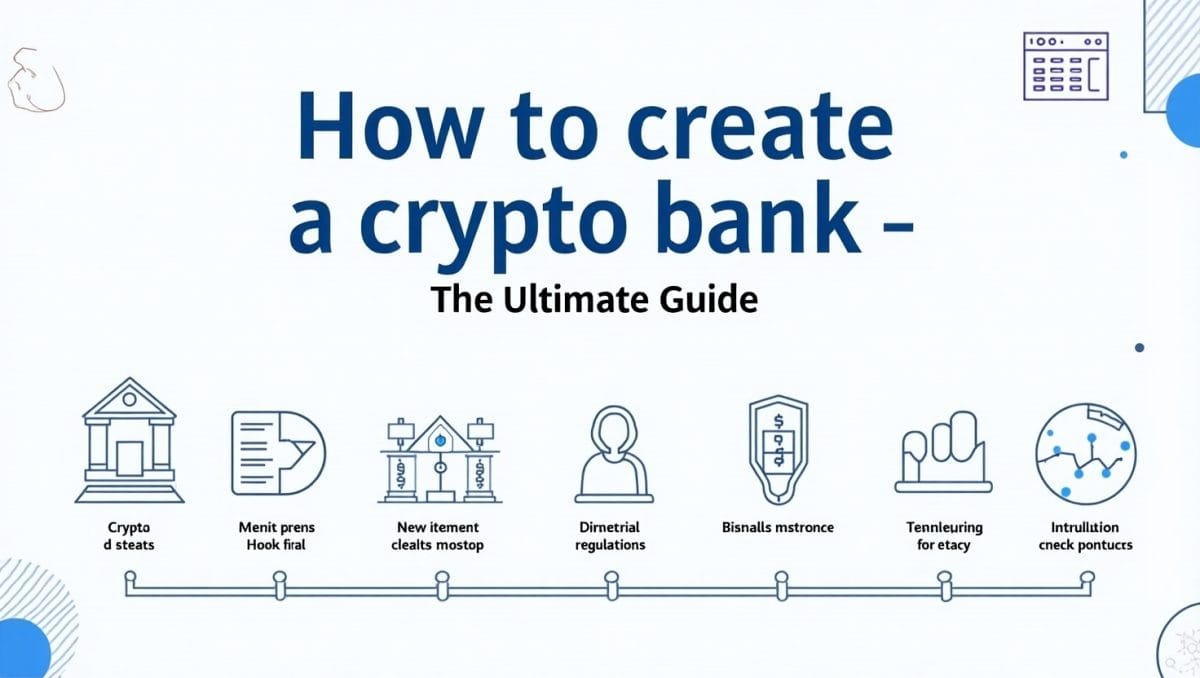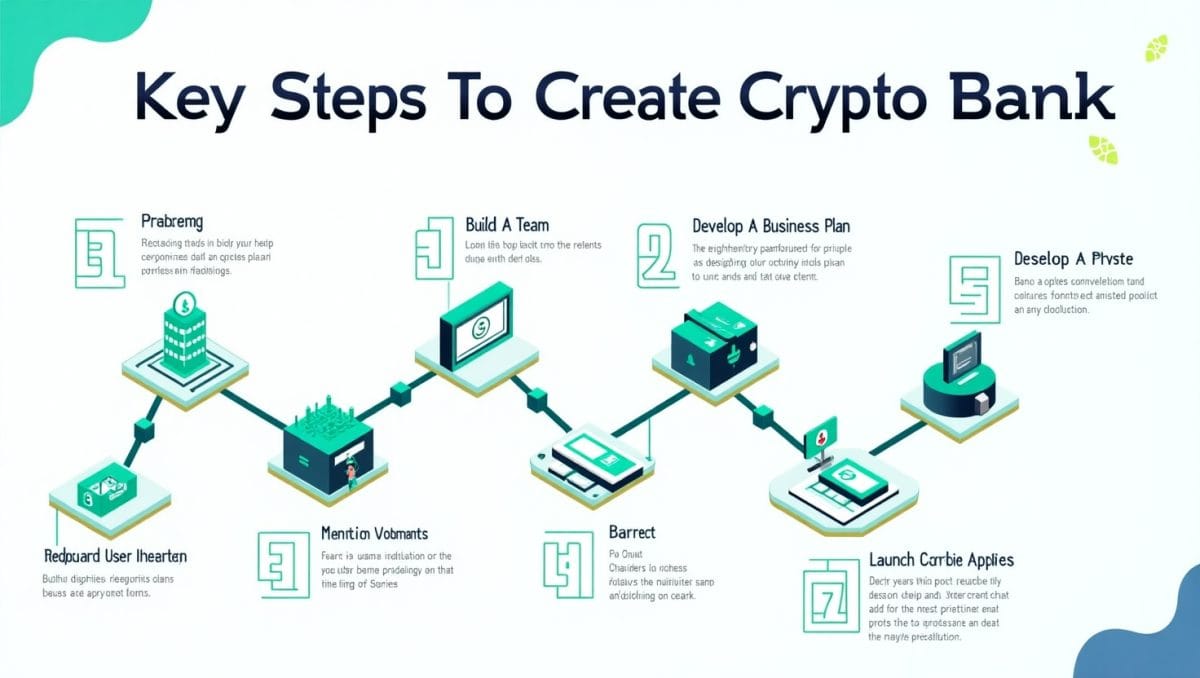Are you ready to dive into the cutting-edge world of crypto banking? This comprehensive guide will walk you through the essential steps of how to create a crypto bank, providing you with the knowledge and insights needed to embark on this exciting venture.
In today’s rapidly evolving financial landscape, crypto banks are emerging as powerful players, bridging the gap between traditional finance and the digital asset ecosystem. Whether you’re a fintech entrepreneur, an investor, or a finance professional looking to capitalize on this transformative trend, understanding how to build a crypto bank is crucial for success in this innovative field.
This article breaks down the process of how to make a crypto bank into clear, actionable steps. We’ll explore everything from navigating complex regulations to implementing robust technology infrastructure. You’ll learn about the key components required to start a crypto bank, including:
- Mastering regulatory compliance
- Designing a solid business plan
- Building secure and scalable technology
- Establishing strong operational processes
- Securing adequate funding
By the end of this guide, you’ll have a thorough understanding of what it takes to create a crypto bank that can thrive in the digital finance revolution. Whether you’re wondering how to start a crypto bank from scratch or looking to pivot an existing financial institution towards crypto services, this resource will provide you with valuable insights and strategies.
Understanding the Crypto Banking Landscape

The financial industry has experienced a dramatic transformation since cryptocurrencies first emerged. By 2025, crypto banking is no longer a niche experiment—it has become a powerful force reshaping traditional finance. For entrepreneurs and institutions alike, grasping this dynamic landscape is essential.
The Evolution of Crypto Banks
Crypto banks have long outgrown their original role as simple digital currency custodians. Today, they are leading financial innovation by merging conventional banking with digital assets. New-generation crypto banks now offer a broad spectrum of services, including:
Advanced Crypto Storage:
Beyond basic wallets, crypto banks now deliver institutional‐grade custody solutions featuring multi-layer security protocols. With recent regulatory shifts easing the pathway for banks to hold digital assets, secure custody is now a cornerstone of crypto banking.
DeFi Integration:
Many institutions have integrated decentralized finance protocols into their offerings. This allows users to participate in yield farming, liquidity provision, and other DeFi services directly through their bank accounts.
Cross-Chain Interoperability:
To support a diverse range of digital assets, leading crypto banks now facilitate seamless transactions across multiple blockchain networks, thereby enhancing flexibility and broadening market access.
Crypto-Fiat Gateways:
A robust, instant conversion mechanism between cryptocurrencies and traditional fiat currencies has become a standard feature. For example, major banks in Spain are preparing to leverage platforms like Visa Tokenized (VTAP) to issue digital tokens tied to fiat money.
Market Growth and Adoption
Crypto banking has witnessed explosive growth over the past few years. According to the latest institutional research, the global cryptocurrency market cap soared to approximately $ 3.28 trillion in early 2025—a 66.8% increase compared to 2024. Equally remarkable, according to statista , over 861 million users worldwide are expected to engage with cryptocurrencies by 2025, and institutional investors have embraced digital assets to the extent that about 22% of financial advisors reported allocating to crypto in client accounts in 2024. This represents a significant increase from previous years, with crypto allocations doubling year-over-year to reach a new high. The growing adoption of digital assets by both retail and institutional investors underscores the increasing mainstream acceptance of cryptocurrencies as a legitimate asset class.
This surge is driven by enhanced regulatory clarity and the rapid evolution of digital infrastructure. With pro-crypto policies and new executive orders easing previous restrictions, traditional banks are now actively partnering with crypto service providers. This integration is enabling financial institutions to offer secure crypto custody, streamlined payment conversions, and innovative asset management products.
Looking Ahead
As crypto banks continue to innovate and expand their service offerings—from advanced storage solutions and DeFi integrations to seamless cross-chain operations and robust crypto-fiat gateways—they are not only redefining financial services but also paving the way for a new era of institutional adoption. For anyone aiming to build or invest in a crypto bank, staying informed about these trends and leveraging the latest data is crucial for long-term success.
In this rapidly evolving landscape, the convergence of technological innovation, regulatory progress, and growing market acceptance is setting the stage for crypto banking to play an increasingly central role in global finance.
Key Steps: How to create a crypto bank

Starting a crypto bank demands a meticulous, phased approach. It’s a journey that requires careful consideration of regulatory landscapes, cutting-edge technology, and efficient operational frameworks. Understanding how to create a crypto bank involves a long and complex process, best approached with a structured, step-by-step methodology. Let’s explore the essential stages, providing a comprehensive guide on how to make a crypto bank a tangible and thriving enterprise.
1. Master Regulatory Compliance: Essential for How to create a crypto bank
This is critical. Compliance is the base of your crypto bank. It’s the most complex and vital step, needing expert legal help. Crypto regulations are always changing, different everywhere, and often unclear. Following these rules is essential for your bank’s legitimacy and survival. For anyone considering how to build a crypto bank, this step is first.
Choose the Right Jurisdiction to Start a crypto bank
First, pick a location for licensing and operations. This choice should match your business plan with a place that supports crypto but also protects consumers and ensures financial stability. When considering how to start a crypto bank, jurisdiction is paramount.
Clear Regulations: Choose places with clear crypto rules like Switzerland, Singapore, and some EU countries. They offer clearer paths for licenses when you create a crypto bank.
Licensing: Research crypto bank licenses in your chosen area. Some places have special crypto licenses, others use regular banking licenses for crypto services. Understanding licenses is key to how to start a crypto bank legally.
Taxes: Understand crypto tax rules in your location for your business and customers. Crypto tax is complicated, and clarity is important for operations and customer trust when you build a crypto bank.
Stable Politics: Consider political and economic stability. Regulations can change, and stable places reduce risks from sudden policy changes when you make a crypto bank.
Secure Banking Licenses to Operate Your Crypto Bank
Getting a banking license is your official permission to operate. It’s tough, requiring lots of paperwork, proof of funds, and a solid business plan. This is a crucial step in how to create a crypto bank.
License Types: Research available banking licenses. Potential options include digital bank licenses, regular bank licenses for crypto, or e-money licenses, depending on your services when you start a crypto bank.
Apply Carefully: Prepare for a long, detailed application. You’ll need business plans, financial forecasts, risk plans, and proof of compliance readiness to build a crypto bank.
Capital Needs: Be ready to meet strict capital rules. Regulators require strong financial reserves to protect the bank and handle crises when you make a crypto bank. These needs vary by location.
Ongoing Oversight: Getting a license is just the start. Expect regular checks, audits, reporting, and keeping up with changing rules for your crypto bank.
AML/KYC Compliance for Your Crypto Bank
AML and KYC rules are vital for fighting financial crime. In crypto, they’re even more important because crypto transactions can be anonymous. Strong AML/KYC is essential for anyone learning how to build a crypto bank.
KYC Procedures: Use thorough KYC to confirm customer identities. This means collecting and checking IDs, doing background checks, and watching customer transactions when you create a crypto bank.
Transaction Monitoring: Use advanced systems to watch for unusual activity and flag suspicious crypto transactions. These systems must understand blockchain transactions if you want to make a crypto bank.
Compliance Team: Hire a Compliance Officer with AML/KYC expertise and build a compliance team. They’ll manage your AML/KYC program as you start a crypto bank.
Regular Checks & Training: Regularly audit your AML/KYC program and train staff to stay updated on rules and best practices for your crypto bank.
Data Privacy and Security for Your Crypto Bank
Data privacy and security are legal and ethical musts. Rules like GDPR and CCPA demand strong data protection. Data protection is key in how to make a crypto bank secure and trustworthy.
Data Policies: Create detailed data protection policies to meet all regulations. These policies must cover data collection, storage, processing, and sharing when you build a crypto bank.
Secure Infrastructure: Invest in secure data systems to protect customer data from breaches and cyberattacks. Use encryption, access controls, and strong cybersecurity for your crypto bank.
Breach Response Plan: Have a clear plan for data breaches, including incident response, data recovery, and reporting rules when you start a crypto bank.
Privacy Officer & Training: Appoint a Privacy Officer to oversee data protection and train all staff on privacy for your crypto bank.
Adapt to Changing Regulations to Sustain Your Crypto Bank
Crypto regulations are always changing. New rules appear, old ones change, and interpretations evolve. Your crypto bank must be flexible to handle this changing environment. Adaptability is crucial for anyone wondering how to start a crypto bank and stay successful.
Monitor Continuously: Track regulatory news globally. Watch for new rules, policy changes, and enforcement actions that affect your crypto bank.
Flexible Compliance: Build a compliance system that can quickly adapt to new rules. It should be scalable and flexible for your crypto bank.
Engage with Regulators: Talk to regulators and industry groups. Join discussions, ask for clarity on rules, and help shape future policies for how to create a crypto bank.
Expert Legal Advice: Hire legal experts in crypto regulations. They are essential for navigating complex rules and staying compliant as you build a crypto bank.
Stay Compliant – Protect Your Crypto Bank
Make compliance a continuous priority, not just a one-time task. Invest in compliance, build a strong compliance team, and be ready to adapt to changing rules. Your bank’s long-term success depends on it when considering how to make a crypto bank.
2. Design Your Crypto Bank Business Plan
A solid business plan is your guide for your crypto bank. It’s more than just for investors; it defines your customers, services, revenue, and market position. A detailed plan is vital for funding, licenses, and long-term operations. A strong business plan is the base for how to build a crypto bank that succeeds.
Identify Your Target Market for Your Crypto Bank
Start by defining your target market. Who are you trying to serve? Knowing your ideal customer will shape your services, marketing, and bank design. Knowing your audience is key to how to start a crypto bank that meets market needs.
Retail Crypto Users: Target individuals wanting crypto banking for daily use, investments, and secure crypto storage. They’ll want easy-to-use interfaces, mobile apps, and easy crypto-to-fiat exchange when you create a crypto bank.
Businesses: Focus on businesses needing crypto payment processing, digital asset management, and crypto financing. They’ll need APIs, merchant tools, and corporate accounts if you want to make a crypto bank business-friendly.
Institutional Investors: Serve institutions needing secure custody, prime brokerage, and crypto investment products. They require top-level security, compliance, and trading platforms if you build a crypto bank for institutions.
Niche Markets: Consider niche markets like DeFi users, NFT collectors, or specific regions with high crypto use. Serving niches can make your crypto bank unique.
Define Your Service Portfolio for Your Crypto Bank
What crypto banking services will you offer? Your services must fit your target market, the competition, and your tech abilities. Consider these services when thinking about how to create a crypto bank:
Digital Asset Custody: Secure storage for crypto for individuals and institutions. This is basic for any crypto bank, needing strong security like cold storage and multi-sig wallets to build a crypto bank.
Crypto-Fiat Exchange: Easy exchange between crypto and fiat. This is crucial for user adoption and bridging traditional and crypto finance when you make a crypto bank accessible.
Crypto Lending: Offer crypto-backed loans and crypto loans. This includes loans using crypto as collateral or loans in crypto if you start a crypto bank with lending services.
Crypto Payments: Enable businesses to accept crypto payments and facilitate crypto transactions for customers. This needs payment gateway integration and merchant tools for your crypto bank.
Crypto Investments: Offer crypto investment products like ETFs, structured products, or yield accounts. This targets investors wanting crypto market exposure when you create a crypto bank.
DeFi Integration: Consider DeFi integration for yield farming, staking, or other DeFi services. This can attract crypto-native users seeking higher yields when you build a crypto bank.
Plan Your Revenue Model for Your Crypto Bank
How will your crypto bank make money and stay profitable? A sustainable revenue model is vital for long-term success when considering how to make a crypto bank. Think about these revenue streams:
Custody Fees: Charge fees for secure crypto storage, often a percentage of assets stored in your crypto bank.
Transaction Fees: Charge fees for crypto-fiat exchanges, crypto payments, and crypto trading on your crypto bank platform.
Lending Interest: Earn interest from crypto loans and borrowing services offered by your crypto bank.
Investment Product Fees: Charge management or performance fees on crypto investment products offered by your crypto bank.
Premium Services: Offer premium services like financial advice or concierge banking for higher fees at your crypto bank.
Partnership Revenue: Generate income from partnerships with financial firms, FinTechs, or crypto services for your crypto bank.
Analyze the Competition to Position Your Crypto Bank
Understanding the crypto banking market is key to finding your place and gaining an edge. Competitive analysis is vital for anyone considering how to make a crypto bank competitive.
Competitor Analysis: Study existing crypto banks and their services, target markets, pricing, and marketing as you start a crypto bank.
Traditional Banks in Crypto: Assess crypto efforts by traditional banks and FinTechs. Understand their strengths and weaknesses in crypto as you build a crypto bank.
DEXs & DeFi: Evaluate competition from DEXs and DeFi platforms offering decentralized banking alternatives when you create a crypto bank.
Unique Value: Define your bank’s unique value. What will make you stand out? Focus on specialization, service, innovation, or niche markets to make a crypto bank successful.
Specialize to Make Your Crypto Bank Stand Out
Don’t try to do everything. Specialize in a niche market or service where you can excel and gain a strong advantage. Focus on a specific customer group and tailor your services to their needs. This focused approach is more effective than a broad strategy in a crowded market when considering how to build a crypto bank.
3. Build Secure and Scalable Technology for Your Crypto Bank

Technology is the core of your crypto bank. It must be strong, secure, scalable, and compliant. A reliable tech stack is crucial for trust and operations. Robust technology is fundamental to how to build a crypto bank that is both secure and efficient.
Choose a Core Banking System for Your Crypto Bank
A core banking system is your bank’s central system, managing accounts, transactions, and records. You have two main choices when deciding how to create a crypto bank:
Integrate Existing Systems: Connect crypto operations to a traditional banking system. This can be familiar but may not suit crypto’s speed and needs for your crypto bank. Legacy systems may struggle with crypto transactions.
Custom System: Build a system specifically for crypto banking. This offers flexibility and control but requires more investment in development if you make a crypto bank. Consider modular design for scalability and future changes.
Integrate Blockchain and Crypto Support into Your Crypto Bank
Seamless blockchain integration and support for various cryptos are essential for a crypto bank. Effective blockchain integration is essential for how to make a crypto bank functional.
Multi-Blockchain Support: Support multiple blockchains, not just Bitcoin and Ethereum. Consider Litecoin, Ripple, and others based on demand and tech feasibility as you build a crypto bank.
API Integration: Develop strong APIs to connect with blockchains, exchanges, payment processors, and other services. APIs are key for automation and system connection for your crypto bank.
Smart Contracts: Use smart contracts for process automation, secure escrow, or new financial products. Smart contracts can boost efficiency and transparency when you create a crypto bank.
Crypto Selection: Have a clear strategy for choosing which cryptos to support. Consider market size, liquidity, security, regulations, and customer demand when you start a crypto bank and decide on digital assets.
Implement Top-Tier Cybersecurity for Your Crypto Bank
Cybersecurity is paramount in crypto. Crypto banks are major targets, so you need bank-level security to protect assets and data. Cybersecurity is paramount for how to build a crypto bank that is secure and trustworthy.
Cold Storage: Use cold storage for most customer crypto assets. Offline storage of private keys greatly reduces online hacking risks for your crypto bank.
Multi-Sig Wallets: Use multi-signature wallets requiring multiple approvals for transactions. This adds security and prevents single points of failure when you make a crypto bank.
Security Testing: Regularly conduct penetration testing and security audits by experts to find weaknesses and check security effectiveness of your crypto bank.
Intrusion Prevention: Use advanced intrusion detection and prevention systems to monitor networks, detect threats, and block cyberattacks on your crypto bank.
Employee Training: Train employees on security best practices, password management, phishing awareness, and data security protocols for your crypto bank.
Ensure Scalability and Reliability of Your Crypto Bank Tech
Your tech must be scalable and reliable to handle growth and high transaction volumes. Scalability and reliability are essential for how to make a crypto bank sustainable.
Cloud Infrastructure: Consider cloud infrastructure for scalability, flexibility, and cost savings. Choose cloud providers with strong security and compliance certifications when you build a crypto bank.
Load Balancing: Use load balancing and redundancy to ensure system uptime and prevent downtime, especially during peak loads for your crypto bank.
Performance Monitoring: Set up performance monitoring to track system metrics, find bottlenecks, and optimize for speed and efficiency when you create a crypto bank.
Disaster Recovery: Create and test a disaster recovery plan to ensure business continuity after system failures or disasters for your crypto bank.
Security First, Always for Your Crypto Bank
In crypto, security is everything for customer trust and your bank’s reputation. Prioritize security above all else. Invest in cybersecurity expertise, use advanced security tech, and build a security-focused culture. A security breach can destroy your bank’s reputation and future when considering how to build a crypto bank.
4. Build a Strong Crypto Banking Operation
Operations are about building the human side of your crypto bank. This means hiring a skilled team, setting up efficient processes, and creating a customer-focused culture. Operational excellence is crucial for smooth operations, happy customers, and managing risks. Operational excellence is key to how to start a crypto bank that provides superior service.
Assemble a Skilled Team for Your Crypto Bank
A successful crypto bank needs a diverse, expert team in banking, crypto tech, regulations, and customer service when you create a crypto bank.
Banking Professionals: Hire experienced bankers in risk management, compliance, lending, and traditional banking operations. Their knowledge is invaluable for your crypto bank.
Crypto Technologists: Recruit blockchain developers, cybersecurity experts, and crypto specialists. Their tech skills are vital for your crypto bank infrastructure.
Compliance Experts: Build a strong compliance and legal team with crypto regulation, AML/KYC, data privacy, and licensing expertise for your crypto bank.
Customer Support: Train support staff to handle crypto questions, offer tech help, and provide great digital customer service for your crypto bank.
Visionary Leadership: Have leaders with a clear crypto bank vision, strong management skills, and understanding of both traditional finance and crypto when you build a crypto bank.
Focus on Customer Support for Your Crypto Bank
Great customer support builds trust and loyalty, especially in the new and sometimes risky crypto world. Excellent customer service is paramount for how to build a crypto bank that attracts and retains clients.
Multi-Channel Support: Offer support through live chat, email, phone, and maybe in-person, depending on your customers for your crypto bank.
24/7 Availability: Consider 24/7 support, especially if you have global customers or always-on services for your crypto bank.
Crypto-Savvy Staff: Train support staff on cryptos, blockchain, and your bank’s services as you start a crypto bank.
Proactive Communication: Keep customers informed about updates, security alerts, and regulation changes for your crypto bank.
User-Friendly Interfaces: Design easy-to-use online and mobile platforms for smooth customer experience when you make a crypto bank.
Implement Robust Risk Management for Your Crypto Bank
Risk management is critical in crypto banking due to crypto’s volatility and security risks. Robust risk management is essential for how to make a crypto bank stable and secure.
Risk Assessment: Conduct a detailed risk assessment covering market, credit, operational, regulatory, and cybersecurity risks for your crypto bank.
Risk Mitigation: Develop strategies to reduce each risk, like diversification, hedging, insurance, and strong security for your crypto bank.
Stress Testing: Regularly test your bank’s resilience to market crashes and crises when you build a crypto bank.
Independent Risk Function: Create a separate risk management team with authority to oversee risk across the bank as you create a crypto bank.
Continuous Monitoring: Use systems to constantly monitor risks and identify new threats to your crypto bank.
Seek Strategic Partnerships for Your Crypto Bank
Partnerships can boost your crypto bank’s capabilities and reach. Strategic partnerships are valuable for how to build a crypto bank with expanded capabilities.
Crypto Exchanges: Partner with exchanges for crypto-fiat conversions and liquidity for your crypto bank.
Payment Processors: Integrate with payment processors for crypto merchant payments at your crypto bank.
Custody Providers: Partner with custody specialists for enhanced security and institutional custody services for your crypto bank.
FinTechs: Collaborate with FinTechs for new tech, services, or better customer experiences at your crypto bank.
Traditional Banks: Consider partnerships with traditional banks for payment rails, correspondent banking, or compliance expertise when you start a crypto bank.
Customer-First Operations for Your Crypto Bank
Build your crypto bank around customer needs. Focus on great service, build trust through transparency and security, and create user-friendly experiences. Happy, loyal customers are key to any successful bank, especially when you make a crypto bank.
5. Secure Capital and Funding for Your Crypto Bank
Adequate funding is essential to launch and run your crypto bank. You need enough capital to meet regulations, build infrastructure, cover costs, and handle risks. Adequate capitalization is crucial for how to start a crypto bank that is financially sound.
Meet Capital Requirements to Create a crypto bank
Regulatory capital requirements are a major initial challenge for aspiring crypto banks. These mandated requirements are rigorously enforced by regulatory authorities to ensure systemic financial stability and provide robust protection for client depositors when you build a crypto bank.
Jurisdiction-Specific: Capital needs vary by location and license type. Research the exact requirements for your chosen jurisdiction to make a crypto bank compliant.
Tier 1 Capital: Regulators usually require Tier 1 capital, the highest quality capital, mainly equity and disclosed reserves for your crypto bank.
Maintain Adequacy: Continuously manage capital to meet regulatory standards and absorb losses as you start a crypto bank.
Contingency Plans: Plan for capital shortfalls and how to quickly raise more capital in crises for your crypto bank.
Explore Funding Sources for Your Crypto Bank Venture
Funding a crypto bank can be tough but offers unique opportunities. Funding is a key challenge for how to build a crypto bank, but also a critical enabler.
Venture Capital: Target VC firms specializing in FinTech and crypto. Highlight your business plan, team, and market potential when seeking funding to create a crypto bank.
ICOs/STOs: Consider ICOs or STOs for funding, but be very careful. Token offerings face strict regulations. Focus on security tokens for regulatory compliance as you make a crypto bank.
Strategic Investors: Seek investment from traditional financial firms, tech companies, or crypto businesses. They bring capital, expertise, and networks to help you build a crypto bank.
Reinvest Revenue: Plan to reinvest early revenue to fuel growth and expansion. Sustainable revenue is vital for long-term finance when you start a crypto bank.
Traditional Bank Loans (Limited): Bank loans may be hard to get initially due to crypto risks. But this may improve as crypto becomes more mainstream for crypto banks.
Ensure Financial Sustainability of Your Crypto Bank
Long-term financial sustainability is the ultimate goal for anyone wondering how to make a crypto bank a long-term success. Your crypto bank must generate revenue, manage costs, and build a profitable, resilient business.
Diversify Revenue: Create diverse revenue streams to avoid relying on one income source. Offer varied services and target multiple customer segments when you build a crypto bank.
Cost Management: Control costs to maximize profit. Use tech to automate processes and improve efficiency for your crypto bank.
Financial Projections: Develop detailed financial forecasts to project revenue, costs, and profits. Regularly review and update these to track performance and adapt to market changes as you create a crypto bank.
Capital Reserves & Liquidity Management: Maintain strong capital reserves and manage liquidity to handle market volatility and ensure financial stability for your crypto bank.
Financial Prudence is Key to a Successful Crypto Bank
Approach funding with financial caution and planning. Secure enough capital, manage finances responsibly, and focus on sustainable revenue. Long-term financial health is essential for a lasting crypto bank, especially when you consider how to start a crypto bank.
Need Expert Guidance to Create Your Crypto Bank?
Tokenova stands as a premier consultant advisory firm, specializing in providing tailored, end-to-end solutions to businesses like yours seeking to navigate the intricate landscape of launching a successful crypto bank. From crafting robust regulatory strategies and navigating complex licensing processes to architecting cutting-edge technology infrastructure and optimizing operational setup, Tokenova delivers comprehensive solutions meticulously tailored to your unique vision and strategic objectives.
Ready to transform your crypto bank vision into a tangible reality? Visit us at Tokenova to explore in detail how we can empower you to create a crypto bank that not only thrives but also leads the digital finance revolution.
Qualities of a Successful Crypto Bank
What truly makes a crypto bank thrive? Beyond the operational necessities of how to start a crypto bank, certain core qualities distinguish successful ventures when you build a crypto bank:
Dual-Asset Platform: A top-tier crypto bank must seamlessly handle both fiat and cryptocurrency transactions. Customers should experience effortless transitions between traditional and digital currencies within your crypto bank. This integrated approach is fundamental when you make a crypto bank that caters to a broad audience.
Real-Time, Global Payments: Leverage blockchain technology to offer lightning-fast transactions and significantly cheaper, quicker international payments in your crypto bank. This is a major advantage over traditional banking systems and a key selling point when you build a crypto bank focused on global reach.
Institutional-Grade Security: Implement the highest levels of security and risk management. Your security framework should meet or exceed traditional bank standards. This robust security is absolutely crucial for building trust and attracting larger, institutional clients to your crypto bank. It’s a cornerstone of how to make a crypto bank reputable and reliable.
User-Friendly Design: Prioritize ease of use in every aspect of your platform. Focus on intuitive interfaces, a mobile-first design, and a straightforward onboarding process. Crypto banking should be accessible and not intimidating. When you start a crypto bank, make sure user experience is at the forefront of your design.
Innovation and Flexibility: The cryptocurrency landscape is dynamic and ever-changing. To stay competitive as you start a crypto bank, embrace innovation and adaptability. Continuously explore new technologies, services, and emerging markets to remain at the cutting edge. This proactive approach is vital when you build a crypto bank for long-term success.
Challenges and Considerations in Creating a crypto bank
The journey to create a crypto bank is fraught with unique challenges that demand careful planning and proactive mitigation strategies. Here’s a deeper look into the key hurdles you’ll encounter when you start a crypto bank:
Changing Regulations: A Moving Target in the Crypto Banking World
The regulatory landscape for cryptocurrencies is in constant flux globally. This dynamic nature presents a major challenge when considering how to create a crypto bank. Regulations vary significantly between jurisdictions and are continuously evolving as governments and financial bodies grapple with the implications of digital assets.
- Uncertainty and Compliance Burdens: The lack of globally harmonized regulations creates uncertainty. You must navigate a patchwork of rules that can change rapidly, leading to potential compliance challenges and increased operational costs for your crypto bank.
- Geographical Restrictions: Regulatory variations can limit your operational scope. A jurisdiction that is favorable today might become restrictive tomorrow, impacting your long-term strategy for your crypto bank.
- Need for Constant Vigilance and Adaptation: Success in how to make a crypto bank hinges on continuous monitoring of regulatory changes. You’ll need to be agile and adapt your compliance frameworks proactively to remain legally sound. This requires dedicated legal and compliance teams within your crypto bank.
Security Threats: A Persistent and Evolving Danger for Crypto Banks
Crypto banks, holding both digital and potentially fiat assets, are prime targets for sophisticated cyberattacks. The decentralized and often pseudonymous nature of cryptocurrencies makes them attractive to malicious actors. Robust, ongoing security is not just important; it’s absolutely essential to make a crypto bank trustworthy and viable.
- High-Value Target: The concentration of valuable digital assets makes crypto banks highly attractive targets for hackers and cybercriminals.
- Diverse Attack Vectors: Threats range from phishing and social engineering to sophisticated attacks on blockchain infrastructure and smart contracts. Your security strategy for your crypto bank must be multi-layered and comprehensive.
- Importance of Proactive and Continuous Security: Security cannot be a one-time setup. It requires constant monitoring, updates, penetration testing, and adaptation to emerging threats. Investing in cutting-edge security technologies and expertise is paramount when you build a crypto bank.
Public Trust: Overcoming Skepticism in the Crypto Realm
Building public trust in crypto banks is a significant hurdle, especially given the relative novelty and, at times, misunderstood nature of cryptocurrencies. Negative perceptions stemming from past crypto scams and market volatility can make it challenging to convince users to entrust their assets to a crypto bank.
- New and Misunderstood Technology: Many people are still unfamiliar with cryptocurrencies and blockchain technology, leading to skepticism and a lack of trust in institutions dealing with these assets.
- Past Negative Events: High-profile crypto exchange failures and scams have eroded public confidence in the crypto space, impacting the perception of even legitimate crypto banks.
- Education and Transparency as Key Strategies: To start a crypto bank that gains public trust, prioritize education and transparency. Clearly communicate your security measures, regulatory compliance, and operational procedures. Building a reputation for reliability and openness is crucial.
Competition: A Crowded and Dynamic Market for Crypto Banking
The landscape of crypto banking is becoming increasingly competitive. You’ll face challenges from:
- Emerging Crypto Banks: Numerous new crypto banks are entering the market, vying for the same customer base.
- Traditional Banks Entering Crypto: Established traditional banks are also starting to offer crypto services, leveraging their existing customer base and brand recognition.
- FinTech Disruptors: FinTech companies with agile technology and customer-centric approaches are also strong contenders in the digital finance space.
- Differentiation and Value Proposition are Crucial: To make your crypto bank stand out, you need a clear differentiator and a compelling value proposition. This could be specialization in a niche market, superior technology, exceptional customer service, or unique product offerings. Simply replicating existing models is unlikely to lead to success when you build a crypto bank.
Operational Complexity: Managing the Intricacies of Crypto Banking
Running a crypto bank is inherently complex due to the convergence of cutting-edge technology and intricate regulatory requirements. Successfully create a crypto bank requires specialized expertise across multiple domains.
- Technical Expertise: Managing blockchain infrastructure, custodial solutions, and cybersecurity requires highly skilled technical teams. Finding and retaining talent with expertise in both traditional finance and crypto technologies can be challenging when you make a crypto bank.
- Regulatory Compliance Management: Navigating the evolving regulatory landscape and ensuring ongoing compliance demands specialized legal and compliance professionals.
- Dual-Asset Management Complexity: Managing both fiat and cryptocurrency transactions within a single platform adds another layer of operational complexity. Systems must be integrated seamlessly and securely. Successfully navigating this complexity is essential when you create a crypto bank.
By acknowledging and proactively addressing these challenges and considerations, you can significantly increase your chances of successfully creating a crypto bank that is not only operational but also resilient, trustworthy, and competitive in the evolving financial landscape.
The Future of Crypto Banking
The future of crypto banking is indeed bright and transformative, holding immense potential for those venturing into how to build a crypto bank. While still in its early stages, several key trends signal major developments for anyone interested in how to start a crypto bank. Let’s examine the promising future and transformative potential for individuals and institutions exploring how to make a crypto bank.
Regulatory Landscape: Positive Shifts for Those Looking at How to build a crypto bank
The regulatory environment is evolving in a way that is increasingly favorable, creating a more defined pathway for how to build a crypto bank.
Clearer Regulations Enhance the Crypto Banking Environment: With a pro-crypto stance becoming more prominent, regulatory clarity is significantly on the rise. In regions like the U.S., agencies such as the SEC and OCC are anticipated to embrace more permissive policies concerning digital assets. This regulatory evolution is expected to empower banks to engage in essential crypto activities like custody services, stablecoins, and wealth management. This positive shift is set to stabilize and significantly enhance the overall environment for your crypto bank, making it a more attractive and secure space to operate. For those considering how to create a crypto bank, this regulatory clarity is a welcome development.
Mainstream Adoption: Expanding the User Base for Crypto Banks
Mainstream adoption is steadily increasing, which is significantly expanding the potential user base and market reach for those focused on how to build a crypto bank.
Increasing Integration of Crypto Banking into Traditional Finance: Crypto banking is experiencing deeper integration into the established structures of traditional finance. The growing prevalence of tokenized real-world assets (RWAs), Central Bank Digital Currencies (CBDCs), and Blockchain-as-a-Service (BaaS) platforms is playing a crucial role in making digital assets more readily accessible to everyday users. This convergence is fundamentally reshaping how to make a crypto bank a seamless and user-friendly experience for everyone, regardless of their crypto expertise.
Technological Advancements: Driving Innovation in How to start a crypto bank
Continuous technological innovation is a powerful engine driving the progress and evolution of how to start a crypto bank.
Continued Innovation Fuels the Future of Crypto Banking: Innovation remains a central driving force in the crypto banking sector. The integration of Artificial Intelligence (AI) with blockchain technology is facilitating the development of smarter contracts and more sophisticated decentralized applications. Furthermore, ongoing advancements in crucial areas like scalability, security protocols, and energy efficiency are actively addressing long-standing challenges within the crypto space. These technological breakthroughs are poised to redefine core services such as DeFi integration, NFT banking solutions, and advanced crypto wealth management, ultimately shaping how to start a crypto bank and the services it can offer in the years ahead.
Conclusion: Is a Crypto Bank Right for You?
The future trajectory of crypto banking strongly indicates a significant transformation within the financial industry. Driven by increasing regulatory clarity, accelerating mainstream adoption, and relentless technological innovation, the crypto banking sector is on the cusp of substantial growth and deeper integration with traditional finance. For individuals and institutions contemplating entering this dynamic and evolving sector and considering how to create a crypto bank, a thorough understanding of these key trends is absolutely essential. Navigating this evolving landscape and understanding how to build a crypto bank, how to make a crypto bank, or how to start a crypto bank will be crucial for future success. The ongoing convergence of conventional financial systems with the groundbreaking world of crypto presents both unique challenges and immense opportunities for those prepared to embrace the future of banking and explore how to create a crypto bank effectively.










